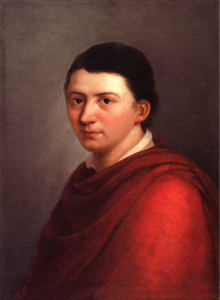The rose
(Poet's title: Die Rose)
Set by Schubert:
D 745
[1822]
Part of Schlegel: Abendröte (putative cycle)
Es lockte schöne Wärme,
Mich an das Licht zu wagen,
Da brannten wilde Gluten,
Das muss ich ewig klagen.
Ich konnte lange blühen
In milden heitern Tagen,
Nun muss ich frühe welken,
Dem Leben schon entsagen.
Es kam die Morgenröte,
Da ließ ich alles Zagen
Und öffnete die Knospe,
Wo alle Reize lagen.
Ich konnte freundlich duften
Und meine Krone tragen,
Da ward zu heiß die Sonne,
Die muss ich drum verklagen.
Was soll der milde Abend,
Muss ich nun traurig fragen.
Er kann mich nicht mehr retten,
Die Schmerzen nicht verjagen.
Die Röte ist verblichen,
Bald wird mich Kälte nagen.
Mein kurzes junges Leben
Wollt’ ich noch sterbend sagen.
Beautiful warmth lured
Me to dare to come into the light,
Where wild sparks were burning:
That is something I shall have to lament forever.
I could have bloomed for a long time
During gentle, bright days;
Now I have to wither early
And renounce life already.
The red light of dawn appeared
And I then left behind my timidity
And opened my bud,
Where all my charms lay.
I was able to emit friendly fragrance
And wear my crown,
But then the sun became too hot,
Which I have to reproach it for.
“What is the point of this gentle evening?”
That is what I now have to ask sadly.
It can no longer rescue me,
It cannot dispel my agonies.
The sunset has faded,
And the cold is soon going to eat me up.
My short young life
Is what I wanted to speak about as I was still dying.
All translations into English that appear on this website, unless otherwise stated, are by Malcolm Wren. You are free to use them on condition that you acknowledge Malcolm Wren as the translator and schubertsong.uk as the source. Unless otherwise stated, the comments and essays that appear after the texts and translations are by Malcolm Wren and are © Copyright.
☙
Themes and images in this text:
Buds Crowns Evening and the setting sun Fading and losing colour Fire Morning and morning songs Pain Red and purple Roses and pink Smells The sun
Schlegel’s Abendröte (literally ‘evening redness’) is a collection that presents the poet as a medium channelling the thoughts and utterances of people and nature before and after the sun sets. The rose is the sixth speaker (after the river and the shepherd, and before the butterfly and the sun). The juxtaposition of the elegiac short-lived rose with the carefree butterfly (so unaware that it is doomed to be equally short-lived) appears to be deliberate. The rose is looking back at the red light of dawn (Morgenröte) from the perspective of sunset (Abendröte) and it feels nothing but regret; the butterfly on the other hand (Schubert’s D 633) is conscious only of the present. There is no lament for the past or mourning for a future that cannot be.
The rose is dying in agony and it blames the sun. It was the morning glow and the illusory sense of warmth which prompted the bud to unfurl, but the open flower was too sensitive to withstand the heat of the midday sun. Although it had carried the flame of redness between dawn and sunset, it is now fading and the cold of night will kill it off. As it sings its lament it looks back in disbelief at how brief its life has been and it is determined to express its pain while it still can. The final line contains an extraordinary twist, though. The rose does not declare that it wanted to speak while it was still alive, but while it was still ‘dying’!
It? It was still alive? It was dying? In German, of course, it, the rose (die Rose), is a she. She is regretting her brief blossoming and her untimely demise. She should not have exposed her charms, she now realises. She was seduced into it. Yet the text as a whole does not have a moralistic tone and does not appear to be uttered as any sort of warning. What has happened is to be lamented and regretted but nothing could have been different. This is how it is. For women throughout most of history this is how it has indeed been. The burdens (and risks) of childbearing have been unavoidable. The bloom cannot last long.
☙
Original Spelling Die Rose Es lockte schöne Wärme, Mich an das Licht zu wagen, Da brannten wilde Gluthen: Das muß ich ewig klagen. Ich konnte lange blühen In milden heitern Tagen; Nun muß ich frühe welken, Dem Leben schon entsagen. Es kam die Morgenröthe, Da ließ ich alles Zagen Und öffnete die Knospe, Wo alle Reize lagen. Ich konnte freundlich duften, Und meine Krone tragen, Da ward zu heiß die Sonne, Die muß ich drum verklagen. Was soll der milde Abend? Muß ich nun traurig fragen. Er kann mich nicht mehr retten, Die Schmerzen nicht verjagen. Die Röthe ist verblichen, Bald wird mich Kälte nagen. Mein kurzes junges Leben Wollt' ich noch sterbend sagen.
Confirmed by Peter Rastl with Schubert’s source, Fridrich Schlegel’s Gedichte. Erster Theil. Neueste Auflage. Wien 1816. Bey B. Ph. Bauer. pages 22-23; with Musen-Almanach für das Jahr 1802. Herausgegeben von A. W. Schlegel und L. Tieck. Tübingen, in der Cotta’schen Buchhandlung, 1802, pages 139-140; and with Friedrich Schlegel’s sämmtliche Werke. Erster Band. Gedichte. Berlin, bei Julius Eduard Hitzig, 1809, page 18.
To see an early edition of the text, go to page 22 [30 von 190] here: http://digital.onb.ac.at/OnbViewer/viewer.faces?doc=ABO_%2BZ20491940X


